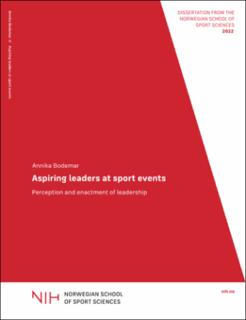| dc.contributor.author | Bodemar, Annika | |
| dc.date.accessioned | 2022-06-21T11:53:02Z | |
| dc.date.available | 2022-06-21T11:53:02Z | |
| dc.date.issued | 2022 | |
| dc.identifier.isbn | 978-82-502-0605-2 | |
| dc.identifier.uri | https://hdl.handle.net/11250/2999822 | |
| dc.description | Avhandling (doktorgrad) - Norges idrettshøgskole, 2022 | en_US |
| dc.description.abstract | The empirical context for this dissertation is leadership in sport and particularly leadership at sport events, within the academic research field of sport management. This dissertation aims to analyse aspiring leaders in sport events, specifically how young people (aged 24–34 years) perceive and enact leadership in various institutional settings in the sport event contexts. To do so, in this dissertation, I examine four research questions: (a) the influence of the institutional context on aspiring leaders’ perceived agency; (b) aspiring leaders’ coping strategies to deal with uncertainty and ensure successfully completed events; (c) the influence of institutional contexts on aspiring leaders’ conformity processes; and (d) the reasons for diminishing leadership and replacement by conformity in the sport event context.
The applied theoretical framework combines neo-institutional theory and two critical leadership perspectives (modes of organizing and functional stupidity). Neo-institutional theory was used to explain how different event contexts enable and constrain leadership. Modes of organizing helped to determine the organizational processes at play and functional stupidity was used to explain the outcome and key drivers behind the organizational processes. The research design is a multiple-case study drawing on qualitative data gathered at two large-scale sport events: the 2012 Innsbruck Youth Olympic Games (YOG) and the 2012 World Snowboarding Championships (WSC). The study uses a qualitative inquiry comprising 47 interviews with staff,representing various hierarchal levels in the organizing committees and is supported by observations before, during, and after the events captured in field notes and documents.
The findings showed that aspiring leaders in highly institutionalized settings, such as the YOG, and loosely institutionalized settings, such as the WSC, perceived pressure, resulting in perceptions of restricted aspiring leaders’ agency and, consequently, leadership. Agency seemed minimized, controlled, and disciplined by top leaders and constrained by external pressure. However, the two institutional contexts created pressure differently. In the YOG, pressure related to institutional expectations to conform to norms and regulations, but in the WSC, a lack of orientation in a loosely structured institutional setting and top managers’ authoritarian behaviours caused pressure. Cross-comparative analyses of the events further revealed two main types of conformity responses towards the pressure and constrained agency: reflexive and cynical. The results show that conformity modes highly depend on the degree of institutionalization of practices, rules, and power structures within the event’s organization. The contextual velocity within sport events, power structures, and pressure towards conformity lead to the phenomenon of fading leadership. To ensure successful event implementation, alternative modes of organizing replace leadership. I observed, for example, aspiring leaders applying management towards volunteers, horizontal processes between the aspiring leaders at the same hierarchical level, and power between the CEO/event owner and the aspiring leaders. Furthermore, pressure towards conformity seems to be a fast-paced process. Therefore, capturing young people’s reflections, especially when they first enter an organization, is important because sport organizations will benefit from reflexive leaders and managers who can solve current and future challenges.
Previous sport management research commonly applied single hierarchical level analyses to study leadership, yielding inaccurate distinctions and definitions of organizational processes that shape leadership. This dissertation contributes to the literature of leadership within sport management by applying multiple hierarchical level analyses and by examining agency through critical leadership studies, consequently exploring aspiring leaders’ possibilities to act as leaders. More specifically, it provides a deeper understanding of how the institutional context affects aspiring leaders’ agency and pressure towards conformity. A main limitation of this dissertation is that it can only provide a snapshot of a few selected cases that represent extreme institutional contexts. Therefore, future research should explore several institutional contexts and apply a long-term perspective.
This dissertation is the first to examine organizational processes in sport events at the microlevel with a critical approach. It explains key drivers and outcomes of conformity processes in different event contexts and illuminates how and why leadership as an organizational mode of organizing fades within a sport event context. Furthermore, this dissertation is the first to examine young peoples’ perceptions and enactments of leadership in sport events. It provides valuable practical implications to owners and organizers of sport events, which have become popular for educating young aspiring leaders. | en_US |
| dc.language.iso | eng | en_US |
| dc.relation.haspart | Paper I: Bodemar, A., & Skille, E. (2016). ‘Stuck in structure’: How young leaders experienced the institutional frames at the Youth Olympic Games in Innsbruck, 2012. International Review for the Sociology of Sport, 51(8), 940-956. https://doi.org/10.1177/1012690214563198 | |
| dc.relation.haspart | Paper II: Bodemar, A., Strittmatter, A.-M., & Fahlen, J. (2021). Doomed to fail? A study of how junior managers at a major sport event cope with leadership issues. International Journal of Sport Management and Marketing, 20 (3-4), 271-288. https://doi.org/10.1504/IJSMM.2020.110845 | |
| dc.relation.haspart | Paper III: Bodemar, A. (resubmitted to Sport in Society). The balancing act of conformity: Aspiring leaders’ response to managerial pressure. | |
| dc.relation.haspart | Paper IV: Bodemar, A. & Skille, E. Å. (submitted to Sport Management Review). The disappearance of leadership? Aspiring leaders’ agency and conformity in various sport event contexts. | |
| dc.subject | nih | |
| dc.subject | doktoravhandlinger | |
| dc.title | Aspiring leaders at sport events: Perception and enactment of leadership | en_US |
| dc.type | Doctoral thesis | en_US |
| dc.description.version | publishedVersion | en_US |
| dc.description.localcode | Institutt for idrett og samfunnsvitenskap / Department of Sport and Social Sciences | en_US |
